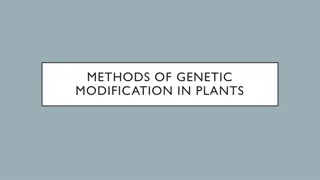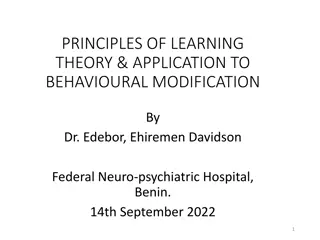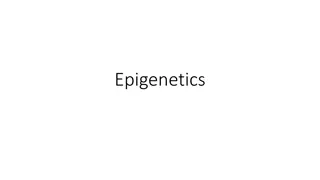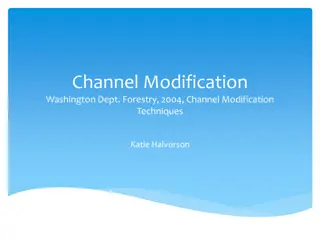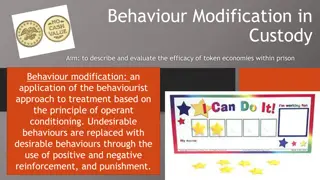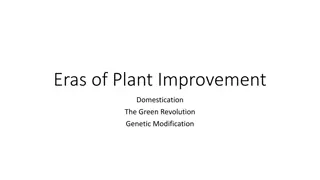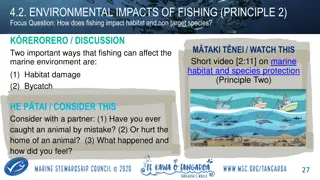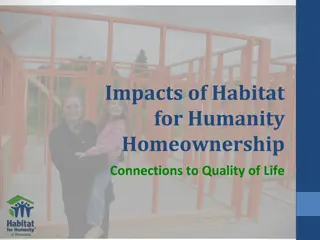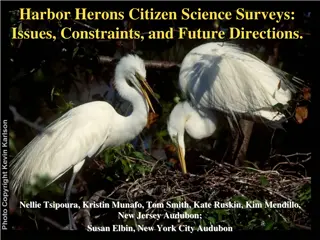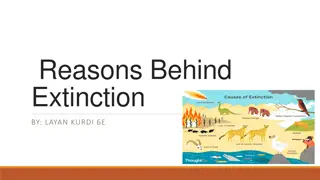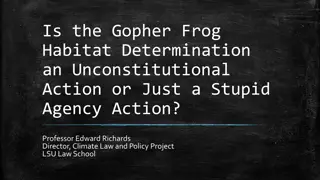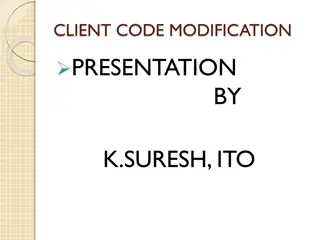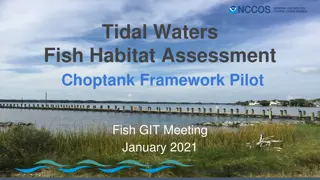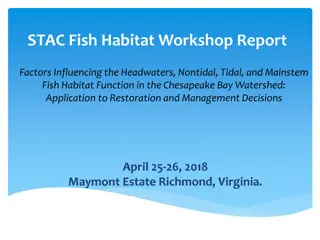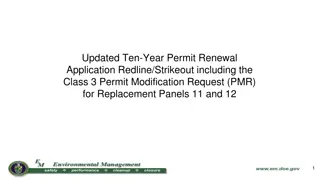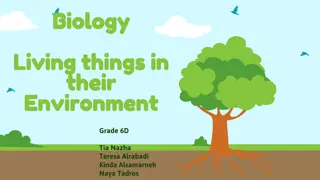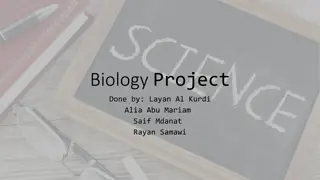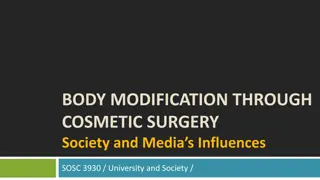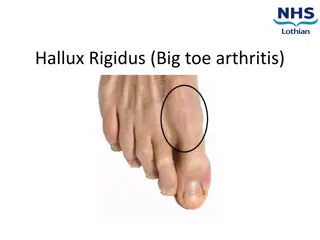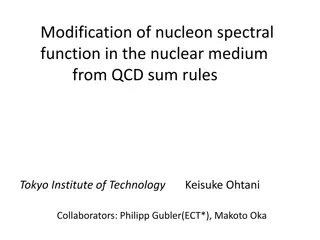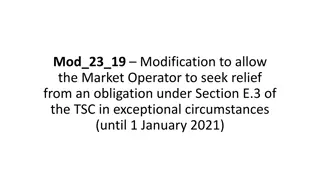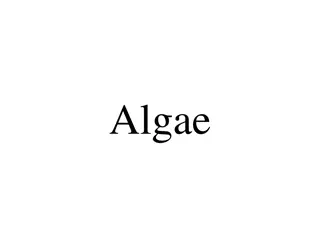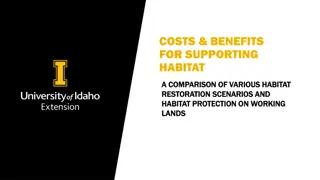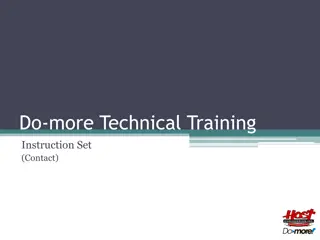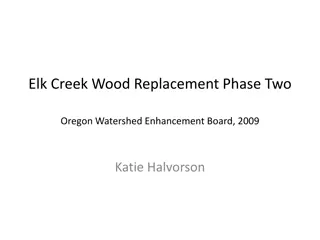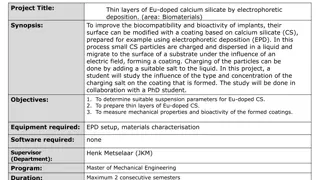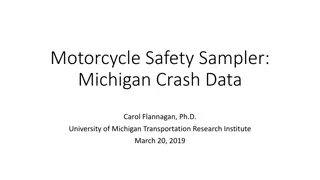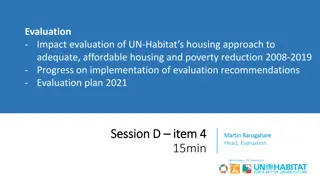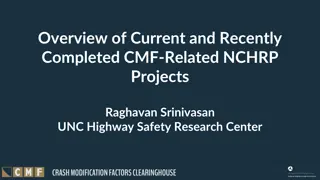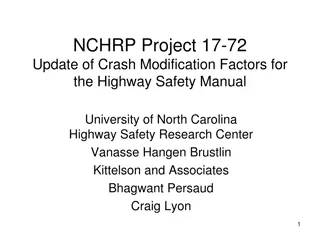Class 2 Permit Modification Request
This Permit Modification Request (PMR) aims to transition audit scheduling for site recertification from an annual to a graded approach, incorporating DOE Orders and Quality Assurance program requirements. The PMR consolidates scheduling information, reduces redundancy, and clarifies subsequent audi
3 views • 22 slides
Designing a Sustainable Mars Habitat for Long-term Crew Stay
Design a Mars habitat for the first human crew that will be staying on Mars for several years. The habitat must include essential components such as sleeping quarters, restroom, exercise room, radiation shielding, food/water supply, entertainment, and ISRU technologies. Teams will research, create a
0 views • 7 slides
Different Methods of Genetic Modification in Plants
Genetic modification in plants can occur through natural selection, selective breeding, and induced mutations. Natural selection involves breeding compatible species to create offspring with desired traits, while selective breeding is a multi-generational process to breed organisms with specific cha
1 views • 11 slides
Proposed Modification of Day-Ahead Energy Offer Window Deadline
ISO-NE is proposing a modification to the Day-Ahead Energy Offer Window by changing the submission deadline from 10:00 AM to 10:30 AM. This adjustment aims to provide suppliers additional time to consider information before finalizing their day-ahead offers and bids. The proposal also includes Tarif
0 views • 12 slides
Understanding Principles of Learning Theory and Behavioral Modification
Explore the principles of learning theory and its application in behavioral modification, highlighting concepts such as classical and operant conditioning. Learning, defined as a permanent change in behavior due to experience, is distinguished from performance. Discover how learning potential differ
2 views • 48 slides
Understanding Epigenetics: DNA Methylation and Histone Modification
Epigenetics involves modifications that impact gene expression without altering DNA sequences, playing a crucial role in the transition from genotype to phenotype. This includes DNA methylation, histone modification, and microRNAs. DNA methylation, controlled by DNMT enzymes, can lead to either gene
5 views • 12 slides
Successful Channel Modification Techniques and Benefits
Channel modification projects aim to accelerate the recovery of stable, sustainable channel forms in dynamic balance with sediment, large wood, and flow regimes. Successful modifications lead to improved habitat quality, stability, and diversity, benefiting sediment transport and riparian zones. Phy
0 views • 15 slides
Token Economies and Behaviour Modification in Custody: Evaluating Efficacy
This article explores the application of token economies in prisons as a behaviour modification technique based on operant conditioning. Token economies involve exchanging tokens for desired behaviours, aiming to replace undesirable actions with positive reinforcement. The use of increments, consist
0 views • 19 slides
Evolution of Plant Improvement: Domestication to Genetic Modification
Plant improvement has evolved through different eras - from ancient domestication to the Green Revolution and genetic modification. Domestication shaped major crops over millennia, the Green Revolution introduced high-yielding varieties, and genetic modification allows direct genetic alterations for
0 views • 6 slides
Understanding Epigenetics: DNA Methylation and Histone Modification
Epigenetics refers to changes in gene expression without altering the DNA sequence. This involves processes like DNA methylation, histone modification, and microRNAs. DNA methylation is controlled by DNA methyltransferase enzymes and plays crucial roles in gene activation and silencing. Histone modi
0 views • 13 slides
Environmental Impacts of Fishing: Habitat Damage and Bycatch
Fishing can negatively impact the marine environment through habitat damage and bycatch. Habitat damage occurs when fishing gear harms delicate seafloor habitats where endangered species grow. Bycatch, or unwanted catch, involves unintentionally capturing marine species like whales, dolphins, and se
0 views • 4 slides
Impact of Habitat for Humanity Homeownership on Quality of Life
A study by Wilder Research on Habitat for Humanity homeowners in Minnesota reveals positive impacts on safety, health, education, social connectedness, family interaction, personal well-being, and economic situation. Results show improved quality of life, with high levels of satisfaction and safety
0 views • 13 slides
Challenges and Solutions in Harbor Herons Citizen Science Surveys
The Citizen Science Surveys regarding harbor herons face various challenges such as habitat assessments, effects of tides, distance issues, and discrepancies in data entry. Volunteer input, carefully crafted protocols, and maintaining contact with volunteers help in addressing these challenges. Solu
0 views • 29 slides
Threats to Wildlife Conservation: Understanding Extinction Causes
Animals face extinction due to genetic factors, habitat destruction, invasive species, global warming, hunting, and illegal trade. Black rhinos are critically endangered mainly due to poaching and habitat loss. Tree kangaroos and rockhopper penguins are also at risk due to habitat degradation and cl
0 views • 6 slides
Legal Analysis of Gopher Frog Habitat Determination
Professor Edward Richards from LSU Law School discusses the potential constitutional issues raised by the designation of critical habitat for the gopher frog. The analysis includes examining interstate commerce issues, regulatory takings, wetlands permitting under the CWA, and the proper designation
0 views • 11 slides
Client Code Modification and Tax Evasion: Regulatory Issues in Stock Exchanges
Client Code Modification (CCM) is a service provided by Stock Exchanges to rectify errors in client codes during trading hours, but it has been misused for tax evasion by some brokers. Investigations revealed significant modifications leading to tax evasion. Regulatory bodies like SEBI and CBDT have
0 views • 41 slides
Tidal Waters Fish Habitat Assessment Choptank Framework Pilot Fish GIT Meeting January 2021
The Tidal Waters Fish Habitat Assessment Choptank Framework Pilot Fish GIT Meeting held in January 2021 discussed background, drivers, and the selection of the Choptank River as a candidate tributary. The project team, responsible parties, actions, and timeline for developing an analytical framework
0 views • 17 slides
Factors Influencing Fish Habitat in Chesapeake Bay Watershed Workshop Report
This workshop report delves into the factors affecting fish habitat function in the Chesapeake Bay Watershed, focusing on headwaters, nontidal, tidal, and mainstem areas. It outlines the workshop process, assessment frameworks, and user needs to support restoration and management decisions. The repo
1 views • 31 slides
Updated Ten-Year Permit Renewal Application - Class 3 Permit Modification Request
Explanation of the submission made to the NMED in response to their request to update the Ten-Year Permit Renewal Application with redline/strikeout changes, including the Class 3 Permit Modification Request for Replacement Panels 11 and 12. Details the specific NMED request, updates made to the Ren
1 views • 13 slides
The Fascinating Malayan Tapir: Habitat, Range, and Adaptations
The Malayan tapir, the largest of its kind, is uniquely adapted to its habitat in tropical lowland swamps, montane and hill forests. With its distinctive black and white color pattern for camouflage and a prehensile snout for feeding and communication, this species thrives in Myanmar, Thailand, Mala
0 views • 26 slides
Modification 07_22: Indexation to Calculation of Capacity Payments
The Modification 07_22 involves legal drafting changes for calculating Capacity Payments, including clarifications on Relevant Capacity Year, PERIOD terms, CPI definition, glossaries, and Auction Indexation. The introduction of the INFMOD term remains unchanged, with calculations based on average an
1 views • 6 slides
Threats to Biodiversity: Habitat Loss and Conservation Efforts
Habitat loss is a significant threat to species worldwide, with forests, swamps, plains, and other habitats disappearing due to human activities. The decline of black rhinos and the conservation efforts made to protect them illustrate the impact of such activities on wildlife populations. African Pa
2 views • 12 slides
Influence of Society and Media on Body Modification Through Cosmetic Surgery
The presentation explores how society and media influence body modification through cosmetic surgery, focusing on Foucauldian framework. It discusses the construction of docile bodies, objectification in media, the controlled body by societal norms, disciplined body through fear and expectations, an
0 views • 31 slides
Understanding Hallux Rigidus: Causes, Symptoms, Diagnosis, and Management
Hallux Rigidus, a form of big toe arthritis, causes pain, swelling, and reduced movement in the toe joint. It can be triggered by factors like trauma, footwear issues, and family history. Diagnosis involves a physical examination and possible X-rays. Management includes self-care with pain relief, l
0 views • 13 slides
Modification of Nucleon Spectral Function in Nuclear Medium from QCD Sum Rules
Investigating the modification of nucleon properties in the nuclear medium using QCD sum rules, focusing on hadron properties, mass spectrum, and chiral symmetry restoration. The study discusses the mass differences, non-perturbative contributions, and the analysis of QCD sum rule in nuclear matter.
0 views • 27 slides
Modification Proposal Allowance for Market Operator Seeking Relief
A proposed modification allows the Market Operator to seek relief from specific obligations under the Trading and Settlement Code in exceptional cases. This temporary amendment aims to ease undue burdens on SEMO's operations and prevent detrimental impacts on achieving Code objectives. Requirements
0 views • 5 slides
Understanding Algae: Classification, Habitat, and Reproduction
Algae are chlorophyllous thallophytes that thrive in aquatic environments, producing their own food and oxygen through photosynthesis. They are categorized based on habitat as aquatic, terrestrial, aerophytes, cryophytes, and thermophytes. The three main classifications of algae are Chlorophyceae (g
0 views • 16 slides
Habitat Restoration and Protection Initiatives in SW Washington: Costs and Benefits
Restoration and protection efforts for various habitat scenarios, including non-working land restoration and working land habitat protection in Southwest Washington. The activities for prairie restoration on Scotch Broom infested land are detailed, along with costs associated with restoring prairie
0 views • 24 slides
Building and Using an Incentives and Sanctions Matrix for Behavior Modification
Learning to lead a drug-free lifestyle for the chronically addicted can be challenging, often involving repeated relapses and frustrations. This article explores the use of incentives and sanctions, emphasizing the importance of balancing positive reinforcement with punishment for behavior modificat
0 views • 15 slides
Understanding ROM: Read-Only Memory in Computers
ROM (Read-Only Memory) is a class of storage media used in computers and electronic devices to distribute firmware. While classic mask-programmed ROM is unchangeable, modern types like EPROM and EEPROM can be erased and re-written. Different types of ROM, such as PROM and OTP, offer varying degrees
0 views • 19 slides
Understanding Dangers to Animals: Predators and Habitat Loss
Animals face various dangers in their natural habitats, including predators and habitat loss. Predators like owls, bobcats, and racoons hunt other animals, while habitat loss, such as the melting Arctic ice cap, threatens species like polar bears. Human activities, like beach development, also impac
0 views • 19 slides
Comprehensive Technical Training Instruction Set for Contact Modification
This technical training instruction set provides detailed information on contact modification in a scanning system. From comparing scan values to edge power flow modifiers, the set covers a range of topics essential for understanding and implementing contact modifications effectively. Each instructi
0 views • 7 slides
Elk Creek Wood Replacement Project Overview
This project, led by the Oregon Watershed Enhancement Board in 2009 and documented by Katie Halvorson, focuses on the replacement of wood structures in Elk Creek to enhance watershed function and habitat complexity for juvenile coho salmon. By addressing the lack of large wood, the initiative aims t
0 views • 20 slides
Surface Modification of Implants Using Calcium Silicate Coating
Surface modification of implants using calcium silicate (CS) coatings prepared by electrophoretic deposition (EPD) is a promising technique to enhance biocompatibility and bioactivity. This project focuses on studying the influence of charging salt on the coating formation, preparing thin layers of
0 views • 5 slides
Inspiring Faith and Service: Habitat for Humanity's Christian Mission
Explore the journey of Habitat for Humanity, a global Christian organization dedicated to putting love into action by building homes, communities, and hope. Through faith, humility, and a commitment to serving others, Habitat demonstrates the teachings of Jesus and invites individuals of all backgro
0 views • 12 slides
Motorcycle Helmet Law Modification in Michigan: Impact on Riders' Safety
Study on motorcycle crashes in Michigan after helmet law modification in 2012 reveals a decline in helmet use rates and a subsequent rise in fatalities and serious injuries. Despite stable trends in non-resident involvement, younger riders showed decreased helmet compliance. Not wearing helmets incr
0 views • 12 slides
Exclusion of Difference Charges in Non-RO Events by Tynagh Energy Limited
Tynagh Energy Limited presents a modification proposal, Mod_09_22, aiming to exclude Difference Charges during Non-RO Events. This proposal revisits a previous modification rejected by SEM-C for further engagement and analysis. The context involves the modification's alignment with CRM framework dec
0 views • 9 slides
Impact Evaluation of UN-Habitat's Housing Approach 2008-2019
The Impact Evaluation of UN-Habitat's Housing Approach assessed the impact of UN-Habitat's efforts in providing adequate, affordable housing, and reducing urban poverty between 2008-2019. The evaluation included regional and country reports, focusing on the effects and impacts of UN-Habitat's Housin
0 views • 14 slides
Comprehensive Overview of Current and Recent CMF-Related NCHRP Projects
This detailed overview covers three NCHRP projects focused on Crash Modification Factors (CMFs). It includes project descriptions, completion statuses, and objectives such as developing guidelines for CMF calibration, combining treatments, and formulating future CMFs. The content also delves into sp
0 views • 21 slides
Update of Crash Modification Factors for Highway Safety Manual
This project, led by the University of North Carolina Highway Safety Research Center, focuses on updating Crash Modification Factors (CMFs) for the Highway Safety Manual (HSM). The team aims to assess and develop criteria for CMFs, conduct gap analysis, develop crash modification functions for treat
0 views • 36 slides


